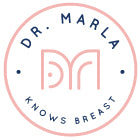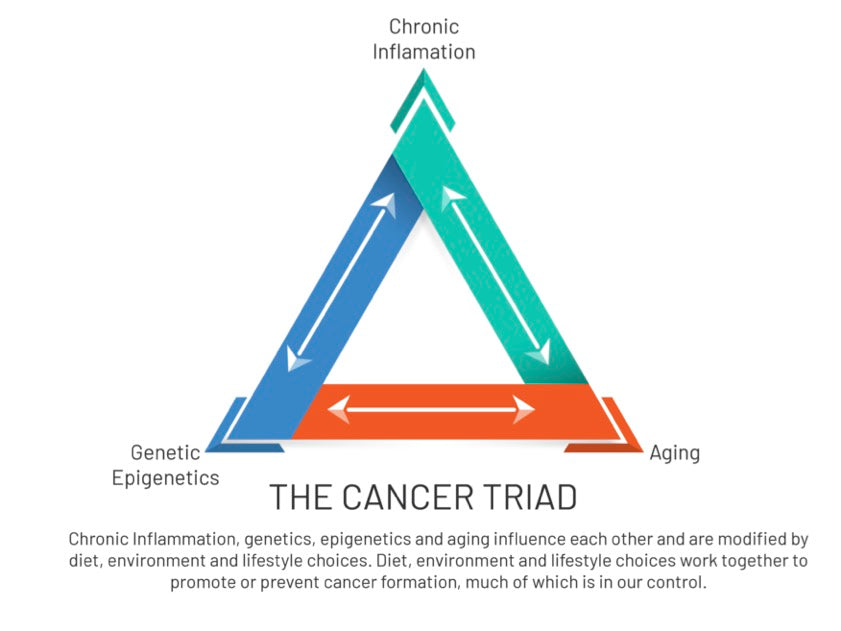The Cancer Triad and Cancer Development
Bullet points:
1. The Cancer Triad: Aging, Genetics/Epigenetics and Chronic Inflammation.
2. Cancer development involves a sequence of stages: initiation, promotion, progression, and finally metastasis. The Cancer Triad has a direct impact on each stage of cancer development.
3. The formation of a clinically significant cancer that affects your health takes years and is strongly influenced by lifestyle choices, emotional stress, and environment.
The Cancer Triad

Cancer development increases as our bodies age. It is important to understand the sequence of cancer development and how three primary factors, what I refer to as the Cancer Triad, influence cancer development and progress. I want you to understand how aging, chronic inflammation, and genetics/epigenetics influences your risk.
At the interface of aging, genetics/epigenetics, and chronic inflammation – what I refer to as the Cancer Triad – is disease and cancer development.
As we age, natural protective mechanisms and inherent cellular repair begin to faulter, our cells become more susceptible to the innumerable assaults that we are exposed to everyday. At a younger age, our cells are able to recover from these assaults without significant long-term consequences.
If you are 20 years old and consume highly processed oils in the form of nondairy creamer daily for the next 10 years, your cellular machinery will likely be able to handle the daily inflammatory insult with little damage.
However, if you continue this habit as you continue to age, the daily inflammatory insult is able to cause damage at the cellular level, with the probability of initiated a cell towards cancer formation.
The Cancer Triad interacts at the cellular level and ultimately determines our health. The interplay of the Cancer Triad is highly influenced by our environment and lifestyle choices through a process called “epigenetics.”
Epigenetics is different than genetic mutations. Our genetic material is “expressed” through different processes in the body and this expression translates into all of the physiologic functions of our bodies. Epigenetics relates to the expression (gene sequence stays the same) of our genetic material as opposed to genetic mutations (change in sequence of the gene).
That is, your genetics do not have the last word. We have a tremendous amount of influence and control over our health through our lifestyle choices, which means we have the power to influence epigenetics and ultimately our health destiny and outcomes!
Cancer development involves a sequence of stages: initiation, promotion, progression and ultimately metastasis, and the Cancer Triad has a direct impact on each stage of cancer development.
Did you know that on average it takes 9 years for most cancers to become a 5mm mass? Cancer is a complex disease, takes years to develop, and requires the presence of many specific factors before it is able to grow and spread. This evolution of cancer has been studied and is well documented in the hallmarks of cancer, which we also write about on this blog.
Cancers grow by doubling time as the abnormal cell that has developed begins to grow in an exponential growth pattern: one cell becomes 2 cells, then 4 cells, then 8 cells, etc… You get the picture. Each type of cancer will have a different growth rate and doubling time, and it generally takes a lot of cells before a cancer is detected.
For example, a 1cm cancer is about 100 billion cells! We can detect cancer by exam or imaging when the volume of cancer cells becomes large enough, usually 5-10mm, depending on which imaging method is used and where in the body the cancer has formed.
We all have microtumors and cancer can be considered a chronic disease that requires daily treatment to keep the microtumors from progressing to clinical cancers, keeping the cancer in a latent stage.
In his book, Foods that Fight Cancer, Drs. Beliveau and Gingras report that autopsy studies performed for women ages 40-50, show that 33% of the women had breast tumors noted on microscopic examination of the breast tissue. For men ages 40-50, 40% had prostate tumors noted during microscopic examination.
The fact that it takes years for a cancer to even become detectable by imaging or examination reveals a potential upside. Our lifestyle choices (e.g., diet, including certain foods and nutraceuticals) and environmental exposure over those years can either promote or hinder cancer initiation and promotion processes.
The diagram above shows factors that influence cancer formation and development. Lifestyle choices influence each stage and exerts the effects through epigenetics.
Understand the first step in cancer development, promotion, discussed in the next blog,

